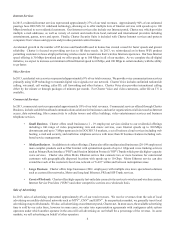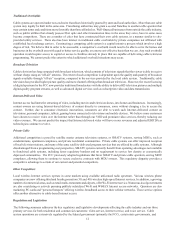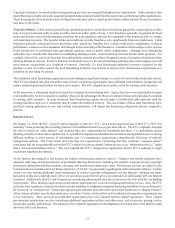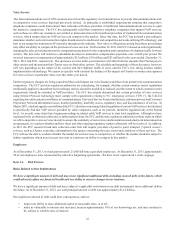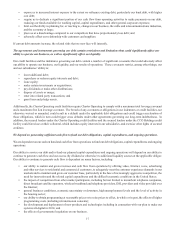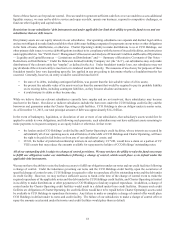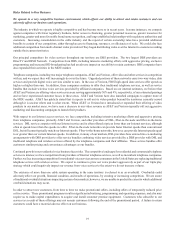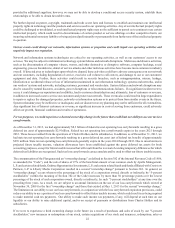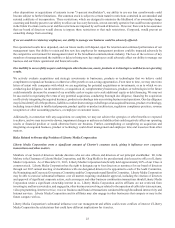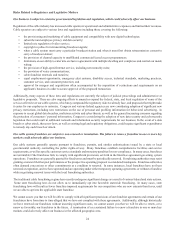Charter 2013 Annual Report Download - page 29
Download and view the complete annual report
Please find page 29 of the 2013 Charter annual report below. You can navigate through the pages in the report by either clicking on the pages listed below, or by using the keyword search tool below to find specific information within the annual report.15
Copyright clearances for non-broadcast programming services are arranged through private negotiations. Cable operators also
must obtain music rights for locally originated programming and advertising from the major music performing rights organizations.
These licensing fees have been the source of litigation in the past, and we cannot predict with certainty whether license fee disputes
may arise in the future.
Franchise Matters. Cable systems generally are operated pursuant to nonexclusive franchises granted by a municipality or other
state or local government entity in order to utilize and cross public rights-of-way. Cable franchises generally are granted for fixed
terms and in many cases include monetary penalties for noncompliance and may be terminable if the franchisee fails to comply
with material provisions. The specific terms and conditions of cable franchises vary significantly between jurisdictions. Cable
franchises generally contain provisions governing cable operations, franchise fees, system construction, maintenance, technical
performance, customer service standards, and changes in the ownership of the franchisee. A number of states subject cable systems
to the jurisdiction of centralized state government agencies, such as public utility commissions. Although local franchising
authorities have considerable discretion in establishing franchise terms, certain federal protections benefit cable operators. For
example, federal law caps local franchise fees and includes renewal procedures designed to protect incumbent franchisees from
arbitrary denials of renewal. Even if a franchise is renewed, however, the local franchising authority may seek to impose new and
more onerous requirements as a condition of renewal. Similarly, if a local franchising authority's consent is required for the
purchase or sale of a cable system, the local franchising authority may attempt to impose more burdensome requirements as a
condition for providing its consent.
The traditional cable franchising regime has recently undergone significant change as a result of various federal and state actions.
The FCC has adopted rules that streamline entry for new competitors (particularly those affiliated with telephone companies) and
reduce certain franchising burdens for these new entrants. The FCC adopted more modest relief for existing cable operators.
At the same time, a substantial number of states have adopted new franchising laws. Again, these laws were principally designed
to streamline entry for new competitors, and they often provide advantages for these new entrants that are not immediately available
to existing cable operators. In many instances, these franchising regimes do not apply to established cable operators until the
existing franchise expires or a competitor directly enters the franchise territory. The exact nature of these state franchising laws,
and their varying application to new and existing video providers, will impact our franchising obligations and our competitive
position.
Internet Service
On January 14, 2014, the D.C. Circuit Court of Appeals, in Verizon v. FCC, struck down major portions of the FCC’s 2010 “net
neutrality” rules governing the operating practices of broadband Internet access providers like us. The FCC originally designed
the rules to ensure an “open Internet” and included three key requirements for broadband providers: 1) a prohibition against
blocking websites or other online applications; 2) a prohibition against unreasonable discrimination among Internet users or among
different websites or other sources of information; and 3) a transparency requirement compelling the disclosure of network
management policies. The Court struck down the first two requirements, concluding that they constitute “common carrier”
restrictions that are not permissible given the FCC’s earlier decision to classify Internet access as an “information service,” rather
than a “telecommunications service.” The Court upheld the FCC’s transparency requirement and the FCC's authority to adopt
regulations regarding the Internet.
As the Internet has matured, it has become the subject of increasing regulatory interest. Congress and federal regulators have
adopted a wide range of measures directly or potentially affecting Internet use, including, for example, consumer privacy, copyright
protections, defamation liability, taxation, obscenity, and unsolicited commercial e-mail. Our Internet services are subject to the
Communications Assistance for Law Enforcement Act ("CALEA") requirements regarding law enforcement surveillance. Content
owners are now seeking additional legal mechanisms to combat copyright infringement over the Internet. Pending and future
legislation in this area could adversely affect our operations as an Internet service provider and our relationship with our Internet
customers. Additionally, the FCC and Congress are considering subjecting Internet access services to the Universal Service funding
requirements. These funding requirements could impose significant new costs on our high-speed Internet service. Also, the FCC
and some state regulatory commissions direct certain subsidies to telephone companies deploying broadband to areas deemed to
be “unserved” or “underserved.” Charter has opposed such subsidies when directed to areas that Charter serves. Despite Charter’s
efforts, future subsidies may be directed to areas served by Charter, which could result in subsidized competitors operating in our
service territories. State and local governmental organizations have also adopted Internet-related regulations. These various
governmental jurisdictions are also considering additional regulations in these and other areas, such as privacy, pricing, service
and product quality, and taxation. The adoption of new Internet regulations or the adaptation of existing laws to the Internet could
adversely affect our business.



